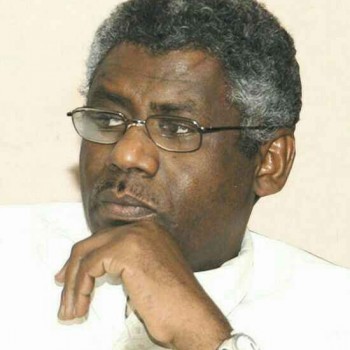What Does the Liberation of Khartoum Mean?

As I See
Adel El-Baz
“Khartoum rose in the dead of night,
Mending those wounds with resolve.
It stood for dawn until it broke,
With a bright forehead and a blood-stained wing,
Carrying both the idea and the promise,
And the hopes in the morning’s light.”
— Abdel Majeed Haj Al-Amin
The Battle for the Liberation of Khartoum has ended with a decisive and clear victory. The Janjaweed fled, individually and in groups, and wherever they go, death will catch up with them. This victory, whose rapid rhythms we are now celebrating, came thanks to the pure souls that ascended to their Lord, pleased and pleasing, and the blood that was spilled on every inch of the capital’s soil. Before the Battle of Khartoum, the capital had two rivers—but the martyrs carved a third river in its heart and around it, flowing with their blood. Just as the Nile remains eternal within us, the river of their blood will continue to flow, immortalized by the memory of their heroism, eternally recorded in the history of the homeland they sacrificed their lives for.
Now, what does the liberation of Khartoum mean? It means that the war is not over, because the Janjaweed gangs and mercenaries did not target Khartoum alone—they are still wreaking havoc in parts of Kordofan and much of Darfur. Therefore, the liberation of Khartoum marks a strategic and geographic shift in the war that begins now. It is a new phase that requires new plans, different mobilization strategies, and a more conscious media approach—one that speaks to the militia’s social base without resorting to hate speech. The war now demands military tactics that are completely different from urban warfare.
The liberation of Khartoum shifts us from a full-scale confrontation with the rebellion to dealing with insurgents within a limited geographic area in certain parts of the country. We have long been accustomed to insurgencies in the regions since independence, and we have gained extensive experience in handling them, both in war and peace. We have moved past the stage of all-out war—war across more than ten states—and the conflict is now shrinking as the insurgents lose control over many areas they once occupied.
Liberating Khartoum signifies the return of the state’s authority and sovereignty over its capital, which stands as the country’s political and commercial center and hosts the largest population concentration in Sudan, where all Sudanese ethnicities blend.
Yes, we face the challenge of rebuilding a shattered capital—but this is not the first time Khartoum has been destroyed. Historically, the capital was crushed by the Mahdist forces in 1885, who overran the city, plundered it, and laid it to waste. (Khartoum always seems to endure!) History is repeating itself! It was also destroyed when Kitchener’s forces invaded it in 1898, looting and ravaging the city—just as the Janjaweed have done now.
Yet every time, Khartoum rises from the darkness, emerging from the rubble and returning as a city of beauty, art, and culture. Every time it falls, its people know how to rebuild it—better than before. If you doubt that, look at the ongoing reconstruction in Omdurman and Bahri. The same youth who defeated the Janjaweed, with the same resolve, will rebuild the capital through the grassroots resistance committees that are already forming among the mobilized forces who helped liberate their homeland from the invaders.
The liberation of Khartoum signals that a massive march toward Darfur is imminent. The first ranks of this sacred march will depart from the liberated capital, and its final ranks will reach Al-Daein. It is a holy march, intended to deny the enemy any chance to recover from their great escape. The mission of purging the country of the last rebel stronghold is what the Sudanese people now expect from their armed forces.
In the liberated Khartoum, a more critical and longer battle awaits us—one that requires true combatants and patriotic minds. This is not just about political alliances; it is about alliances for reconstruction and development, involving everyone: mobilized soldiers, businessmen, media professionals, politicians, and professionals from all fields. They all must take part in rebuilding. The liberation of Khartoum does not mean the battle is over. Anyone who thinks we will now sing and dance on Nile Street, then sleep soundly in our freed homes, is delusional. The road is still long—very long—until we achieve our final victory.
What matters now, at this moment:
“We have triumphed, O my country,
With blood,
With the wounds of the victims,
With sacrifice.”
Congratulations!
Finally,
“If they ask about Khartoum,
Say it has rained with joy,
Its dark era has ended,
The Dagalo clan has been humiliated,
The ‘late one’s’ power has been broken,
And it has reclaimed its glory,
To endure for all time.
If they ask you, ‘Has it returned?’
Say: Yes,
Indeed, it has returned!”



